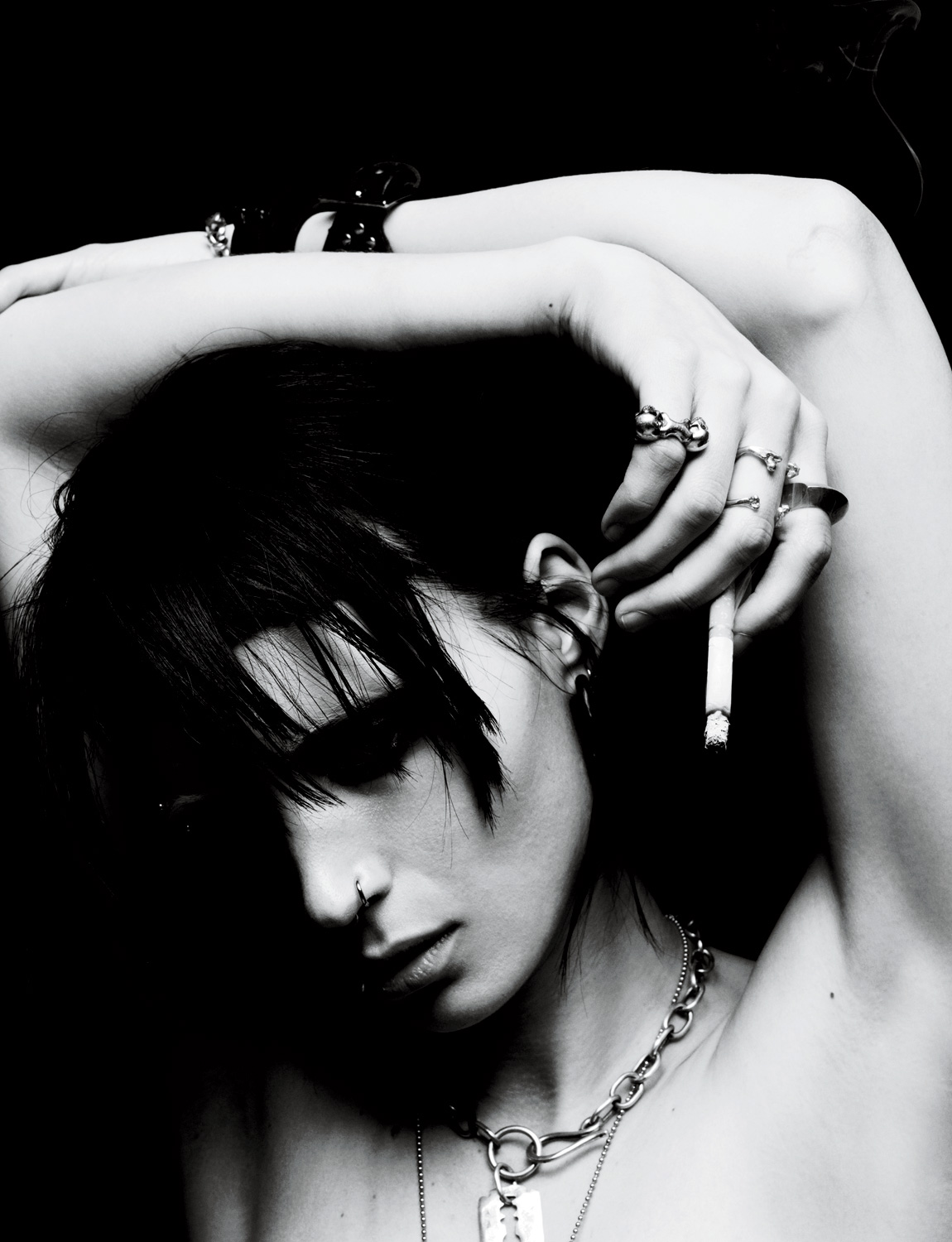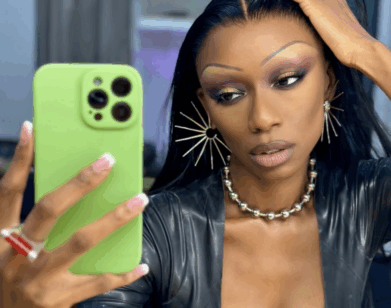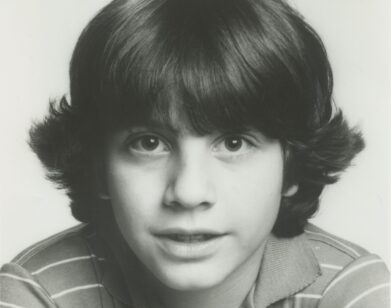Rooney Mara and David Fincher
We all know it’s playing dress-up, but you want people who are ready to explode when they get to do it.David Fincher
In case you haven’t heard, on December 21, the world will finally get to bear witness to 26-year-old Rooney Mara’s performance as one of the most cunning, enigmatic, and unorthodox antiheroines to enter the pop-consciousness in decades. But before Mara was even cast in the role, the question of who would play smashmouth hacker-detective Lisbeth Salander in director David Fincher’s new film adaptation of The Girl With the Dragon Tattoo was a topic almost as hotly debated and endlessly scrutinized as the book itself.
Fincher began casting Dragon Tattoo—based on the first novel of the late Swedish writer Stieg Larsson’s best-selling crime trilogy—in the spring of 2010 after wrapping his Oscar-winning Facebook origin-story, The Social Network, and admits that after seeing a string of candidates for the role of Lisbeth—some of them very well-known—he was beginning to wonder if the kind of actress he was looking for might even exist. Then one of his producers suggested Mara, who had filmed with Fincher for four days on The Social Network, playing Erica Albright, Mark Zuckerberg’s fictionalized girlfriend. Like Lisbeth, Erica was an avenging angel of sorts, albeit of a very different stripe—arguably the only character in the movie to wield any real power over Jesse Eisenberg’s callous, combative Zuckerberg, memorably dumping him in a Cambridge, Massachusetts, pub in the opening scene after he turns their date into a verbal sparring match.
Though Mara’s performance in The Social Network was spot-on, she had yet to really prove herself. Up to that point, Mara—the Bedford, New York–born daughter of Chris Mara, a VP for the New York Giants, great-granddaughter of Giants founder Tim Mara, and younger sister of actress Kate Mara—had only had a few parts on TV and in films like 2009’s Youth in Revolt, the little-seen indies Dare and Tanner Hall, and the 2010 remake of A Nightmare on Elm Street. Nevertheless, Fincher asked Mara to audition, and what followed was an arduous process that lasted more than two months and involved five callbacks. But Mara, was dogged, and in August 2010, Fincher called her into his office, showed her a copy of a press release announcing that she had been cast as Lisbeth, and told her that she had a half an hour to decide if she wanted to take the part.
Of course, Mara accepted the role, and soon traveled to Stockholm to begin work on the film, which required her to undergo a radical physical and emotional transformation: She starved herself rail-thin; she shaved half her head and dyed her remaining hair goth-black; she bleached her eyebrows; she took up smoking; she got numerous body piercings, many of which were front and center in the original NSFW promo poster that surfaced on the Web this past June; and she fully immersed herself in the difficult, brutal, and violent world of Lisbeth as interpreted by the notoriously exacting Fincher who, at the end of the process, remained convinced that in choosing Mara, he had chosen right.
Nevertheless, after experiencing nearly five months of Larsson-esque bliss together in the wilds of Sweden, Mara and her director are still on speaking terms. They actually even seem to like each other. So with the fruits of their labor about to be unveiled, they recently reconnected at Fincher’s office in Los Angeles.
DAVID FINCHER: So tell me about this past weekend. You went to a wedding and you accosted someone?
ROONEY MARA: I didn’t accost anyone.
FINCHER: Well, tell me specifically what happened, as if I was your legal team. How reprehensible was your behavior?
MARA: My behavior wasn’t that bad. It was just very shocking because I’ve never done anything like that before.
FINCHER: So my understanding is that there was an altercation with an enthusiastic, possibly inebriated, mid-20s male who, without your consent, decided to lift you into the air.
MARA: Yes.
FINCHER: And then dance with you as if you were some kind of toy.
MARA: Yes.
FINCHER: And you responded by grasping his larynx—with extreme prejudice.
MARA: I very calmly advised him that I could . . .
FINCHER: Do bodily harm.
MARA: Yes, that I could do serious bodily harm, and that he should probably put me down.
FINCHER: I can’t tell you how happy that makes me.
MARA: Why? I don’t know if it was so much a Lisbeth Salander moment.
FINCHER: No, what I like is that it was a Rooney Mara moment.
MARA: So do you have problems with letting someone else be in control?
FINCHER: I don’t.
MARA: Are you sure?
FINCHER: Absolutely.
MARA: So you’re saying I have free rein to ask you anything right now?
FINCHER: No. I’m not saying I’m foolish and unguarded. I’m just saying I’ll more than likely respond honestly to any questions you ask.
MARA: Okay, then. Is it true that as a young boy, you used to make certain food concoctions and fill up baby dolls with them and then throw them on the freeway?
FINCHER: We did—my friend Charles Atwood and I. My younger sister was probably 10 or 11 years old at the time, and she had this collection of these anatomically correct . . . They looked like 7-month-old or 8-month-old babies.
MARA: Anatomically correct?
FINCHER: I don’t recall whether or not their genitalia were accurately reproduced, but let’s put it this way: They didn’t look particularly doll-like. They were more of a re-creation of an actual human baby.
MARA: I had a doll like that.
FINCHER: You did? Well, she had like five or six of them, and we thought, She’s not going to miss a few. So we would take them and pack them with hamburger and ketchup and throw them into the freeway.
MARA: Was this some type of experiment?
FINCHER: I would file it under “general amusement.”
MARA: So what were your first impressions of me when we met for The Social Network? Did you think I was the character I wound up playing, Erica Albright?
FINCHER: To be honest, I didn’t really have an absolute handle on Erica. I mean, I kept saying to Laray [Mayfield, casting director], “Find me Katharine Ross from The Graduate [1967]. Find me that girl.” I needed the audience to be immediately analyzing Jesse Eisenberg’s character. “What is his major malfunction? Why would he say these horrible things to this girl? She’s so obviously a catch.” One day Laray came to me and said, “I met her—I met that girl. Her name is Rooney, and I’d like you and Aaron [Sorkin, screenwriter of The Social Network] to meet her.” Of course, I then went to my next area of concern: This can’t just be about beauty. She has to be centered. She has to be able to keep up with Jesse—be in lockstep—and in eight pages illuminate a relationship I don’t have time to really see or define. So the first thing was, how do we have Erica be somebody who you can immediately see is not somebody he should be tossing away, and also have her be somebody who’s not just taking abuse? She couldn’t be a battered wife. I also remember, after we shot those scenes, saying goodbye to you. I think you can actually see it on the DVD—you said, “Oh, bye,” and I said, “Oh, hey, thanks,” and I remember thinking I should have said something nicer. I should have actually gone and said, “Hey, thank you so much. That was really great.” I remember regretting not having done that.
MARA: Yeah, I remember you not saying anything nice. [laughs]
FINCHER: Not for lack of wanting to. But I had 90 people I had to keep occupied . . .
MARA: I didn’t hold it against you. I totally understand.
FINCHER: You didn’t seem to understand on the tape.
MARA: I did not seem upset.
FINCHER: You were very polite and nice about it. I didn’t feel bad except in hindsight. You know what it’s like when people come to visit you on set.
MARA: Honestly, I wasn’t offended. I just thought you were very aloof, and I can respect that because I’m very aloof.FINCHER: I’m not aloof . . . Am I aloof? I feel like I am a thousand percent present in whatever is going on. But, I mean, I’m not going to have a conversation about stupid, useless shit . . .
MARA: You’re not as aloof as I am—but you are. [both laugh] I mean, what are the four ways people control one another? Aloof, victim, helper . . .
FINCHER: Victim, oppressor, aloof . . .
MARA: Maybe you’re an oppressor.
FINCHER: I’m not an oppressor.
MARA: Well, you’re either an oppressor or aloof. You have to pick one. You’re certainly not a victim or a helper.
FINCHER: I’m a nurturer. I’m a calming nurturer, don’t you think?
MARA: [laughs] But I guess this is all just a long way of saying that you didn’t really have a first impression of me.
FINCHER: The first impression I had of you was that you were physically striking and that you had an air of great confidence. The thing I was focused on was your verbal facility. I mean, we read people opposite Jesse who wilted under the pressure, and when Aaron and I met you, we both felt, “We’re done. We got this. We can move on.” It doesn’t happen very often, when the hand fits the glove like that. It’s a great relief. So when we started talking internally about who this Lisbeth character in The Girl With the Dragon Tattoo is, I think it was Ceán [Chaffin, one of the film’s producers] who said, “What about Rooney?” And both Laray and I thought, That’s an interesting idea . . . I had already begun positioning the studio the idea that we weren’t going to go to Julia Roberts first with the part. Then I started to kind of match you up with each scene—you know, sort of previsualize you . . .
MARA: Well, it didn’t matter because, at the time, I was like, “He probably shouldn’t bring me in.”
FINCHER: Why would you think that?
MARA: Because I hadn’t read the books yet. But is it or is it not true that this was the very same “centered” quality that made you—or maybe not you, but others—question whether or not I could do this part?
FINCHER: That centeredness was what we needed from you personally in order to be able to do the work that it was going to take to create a character who is truly damaged goods. It’s not something that’s obviously transposable to Lisbeth. I don’t think she has that kind of confidence. I think she has been too betrayed. You want somebody who can play that but who doesn’t personally need emotional resuscitation at the end of every hour. And then somewhere during that incredibly rigorous and infuriating two months where you came back five times to screen-test, it became obvious to me that what I wanted was that puppy in the window—the last one. The more people said no, the more I was like, “I want the girl who wants to be here more than she is being encouraged.” I thought you had all the physical attributes to play the character, and, obviously, I knew you had the chops as an actor, but I really . . . There was a point in time where it actually got embarrassing for me to ask you to do one more thing. But I knew in my head this was going to work out because you wanted it.
MARA: You don’t think any part of that process was you testing me . . .
FINCHER: No. As much as I enjoy the mythology of my sadism, I actually prefer to be encouraging. I much preferred when I got to tell you, “The part is yours.”
MARA: When Laray called me before the first screen tests for Dragon Tattoo, I understand that you had e-mailed her saying, “You know, I’m really interested in Rooney, but I want you to tell her these things”—and I was given a laundry list of things I would have to do if I got the part. You know, “You’re going to have to be a smoker. You’re going to have to get raped. You’re going to have to be naked—a lot.” Then she was like, “You’re going to have to ride a motorcycle.” And that was the only thing on the list where I said, “I can’t do that.”
FINCHER: Rape you can do. You can learn to smoke. But ride a motorcycle? Mara, there weren’t that many things.
MARA: There were a few more.
FINCHER: It wasn’t a minefield.
MARA: It was a long list for just having read for the casting director.
FINCHER: Wasn’t that encouraging?
MARA: It was very encouraging. That’s when I went and read all the books and started starving myself and came back and did the screen tests. I think it was the day before the screen tests you guys added the seven-page rape scene.
FINCHER: Trial by fire.
MARA: Yeah.
FINCHER: But don’t you want to be tested that way? You seem like the type of person who thrives under that kind of pressure. No one likes a crumbling crybaby.
MARA: No, I liked it.
FINCHER: That’s the kind of attitude you’d expect from a person that’s going to play this kind of character.
MARA: You have to weed out the—
FINCHER: Crybabies . . . But I actually have way too much empathy for the performing neurotic. I mean, it must be incredibly anxiety-provoking to act in front of a camera. I can’t imagine doing it. I’ve been asked a couple of times, and I’ve done it as a joke for friends of mine, but I hate it. I always want to be as quick and decisive as I can be.
MARA: You seem to really like actors. Why? We’re not that likable.
FINCHER: Let’s put it this way: I have great appreciation for people who do anything well. I think that it’s very difficult to do what you do well, and, you know, I’m very much dependent on being able to prod or . . .
MARA: So what you’re saying is that I have a lot more control over you than I thought?
FINCHER: I don’t know about control, but let’s put it this way: I want to root for the cast. I used to think 10 years ago, “You know, give me enough time and I can get it. I can get it out of whoever it is.” But I don’t believe that anymore.
MARA: Would you say that you’re pretty good at being able to read people and figure out how different people need to be spoken to?
FINCHER: Well, that’s just the preschool part of it. “Every child is different. Every child responds in a different way.” That’s Psychology 101. That’s just getting people to behave. But we all know it’s playing dress-up, but you want people who are ready to explode when they get to do it. I want them attacking drunken revelers at weddings. That’s what I want. I want people to flourish. I want them to walk away from the experience going, “That’s what it should be like.” I mean, I don’t want people to behave. I want people to surprise themselves. Instead of saying “Oh, god, didn’t we already do this 17 times?”
MARA: Seventeen?
FINCHER: You know what? I’m going to find out exactly what our average number of takes was.
MARA: It’s probably around that number. I mean, I don’t think you did that many. I think people like to exaggerate about the number of takes you do.
FINCHER: Do people really shoot two or three takes and then just move on?
MARA: I don’t know . . . Probably.
FINCHER: When you first heard about the part of Lisbeth, you heard about it from your mom. Your mom said you would be perfect for it, right?
MARA: My mom had e-mailed me because I don’t communicate verbally—I’m more of a thumbmunicator. But she told me her friend had read the book and said, “Oh, my gosh. Rooney has to play this part. She’s perfect for it.” But I just kind of deleted the message. I ignored it.
FINCHER: When was this?
MARA: It was, like, two years ago. And then, when I knew they were going to make an American version of the story, I went to go see the Swedish version of the movie. I thought the movie was great, but I didn’t leave it thinking, “Oh my God. I would be perfect for that.”
FINCHER: So when you came in to audition, did you think this was just a total mercy fuck?
MARA: No, I didn’t, because all the girls who were coming to read for it were supposed to pick a poem that they thought represented the character and read it with a Swedish accent, which I thought was silly. But I found a poem anyway and learned it in somewhat of a Swedish accent, and then two days before I was supposed to come in, they said they wanted me to actually read some scenes and that I would be the first person to read the scenes. So I threw my poem away. It was actually quite a lovely poem.
FINCHER: Who wrote it?
MARA: I can’t remember now . . . So what do you think about The Girl With the Dragon Tattoo as a trilogy? How do you feel about the second or the third book and your involvement in those stories? Would you be sad to have this be it for you of this world and these characters?
FINCHER: I would be most sad if people went, “Eh,” and they didn’t make the second or third one. Second most sad would be to not be asked back. We’ll see what happens . . . So between when we said goodbye on The Social Network and began work on The Girl With the Dragon Tattoo, what had you been doing?
MARA: I hadn’t done anything.
FINCHER: You were just hanging out?
MARA: No, I didn’t want to do anything. I was holding out for something good.
FINCHER: So you quit the business or something and we pulled you back in . . .
MARA: Yeah. I haven’t even taken my eyebrow ring out yet.
FINCHER: I noticed that. I was wondering if it was some sort of show of solidarity because I was doing 20-hour days cutting this motherfucker . . . I noticed you had your eyebrows back, though.
MARA: I had to put them on because of my press day.
FINCHER: So what are the big questions people keep asking about the film? “How many takes did David make you do?”
MARA: Yeah, they all want to know, “How many takes?” and “How do you deal with it?” and blah blah blah, which is so silly. They want to know about your process. But you had already e-mailed me saying I wasn’t allowed to say anything about your process or your personal life. But because no one knows me, the most difficult kinds of questions are, “Can you describe yourself in four words?” or “What are four things that describe you?”
FINCHER: Ice. Cat litter. Eucalyptus. There’s a start.
MARA: I’m going to start using that. I was thinking more along the lines of, like, shy . . .
FINCHER: Demure . . .
MARA: Timid . . .
FINCHER: I don’t think you’re timid at all.
MARA: I’m not.
FINCHER: But people do think that about you. It’s so funny.
MARA: Who says I’m timid? I’ll kill them.
FINCHER: Maybe not timid, but not aloof either. I see you as aloof because I know that you’re shy.
MARA: Somebody asked me what the dragon tattoo meant to the character.
FINCHER: What did you say?
MARA: I said, “I have no idea.”
FINCHER: You should’ve said, “It relates directly to her femininity,” or “It’s about man’s inhumanity to man . . . ”
MARA: What I said was I think Stieg Larsson actually had an answer to that question, but we never found out.
FINCHER: So what are you doing next? Are you reading a lot of scripts?
MARA: I’m too tired to work. I’m still looking for my next film. There’s this movie at Disney I am really interested in.
FINCHER: What is it?
MARA: I don’t want to give out too much information, but it involves a lot of water.
[Editor’s note: The average number of takes for any scene on The Girl With the Dragon Tattoo was seven.]







